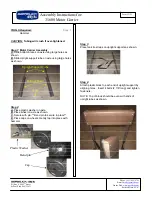
GENERAL INFORMATION
16
Some accessories not manufactured or sold by Mercury Marine are not designed to be safely used with your
outboard or outboard operating system. Acquire and read the installation, operation, and maintenance manuals
for all your selected accessories.
Safe Boating Suggestions
In order to safely enjoy the waterways, familiarize yourself with local and other governmental boating regulations
and restrictions, and consider the following suggestions.
Use flotation devices. Have an approved personal flotation device of suitable size for each person aboard (it is the
law) and have it readily accessible.
Do not overload your boat. Most boats are rated and certified for maximum load (weight) capacities (refer to your
boat capacity plate). If in doubt, contact your dealer or the boats manufacturer.
Perform safety checks and required maintenance. Follow a regular schedule and ensure that all repairs are properly
made.
Know and obey all nautical rules and laws of the waterways. Boat operators should complete a boating safety
course. Courses are offered in the U.S.A. by 1) The U.S. Coast Guard Auxiliary, 2) The Power Squadron, 3) The
Red Cross and 4) your state boating law enforcement agency. Inquiries may be made to the Boating Hotline,
1-800-368-5647 or the Boat U.S. Foundation information number 1-800-336-BOAT.
Make sure everyone in the boat is properly seated. Do not allow anyone to sit or ride on any part of the boat that
was not intended for such use. This includes the back of seats, gunwales, transom, bow, decks, raised fishing
seats, any rotating fishing seat; or anywhere that an unexpected acceleration, sudden stopping, unexpected loss
of boat control, or sudden boat movement could cause a person to be thrown overboard or into the boat.
Never be under the influence of alcohol or drugs while boating (it is the law). Alcohol or drug use impairs your
judgment and greatly reduces your ability to react quickly.
Prepare other boat operators. Instruct at least one other person on board in the basics of starting and operating
the outboard, and boat handling, in case the driver becomes disabled or falls overboard.
Passenger boarding. Stop the engine whenever passengers are boarding, unloading, or are near the back (stern)
of the boat. Just shifting the outboard into neutral is not sufficient.
Be alert. The operator of the boat is responsible by law to maintain a proper lookout by sight and hearing. The
operator must have an unobstructed view particularly to the front. No passengers, load, or fishing seats should
block the operators view when operating the boat above idle speed.
Never drive your boat directly behind a water skier in case the skier falls. As an example, your boat traveling at
40 km/h (25 MPH) will overtake a fallen skier 61 m (200 ft.) in front of you in 5 seconds.
Watch fallen skiers. When using your boat for water skiing or similar activities, always keep a fallen or down skier
on the operator's side of the boat while returning to assist the skier. The operator should always have the down
skier in sight and never back up to the skier or anyone in the water.
Report accidents. Boat operators are required by law to file a Boating Accident Report with their state boating law
enforcement agency when their boat is involved in certain boating accidents. A boating accident must be reported
if 1) there is loss of life or probable loss of life, 2) there is personal injury requiring medical treatment beyond first
aid, 3) there is damage to boats or other property where the damage value exceeds $500.00 or 4) there is complete
loss of the boat. Seek further assistance from local law enforcement.
Recording Serial Number
It is important to record this number for future reference. The serial number is located on the outboard as shown.
















































